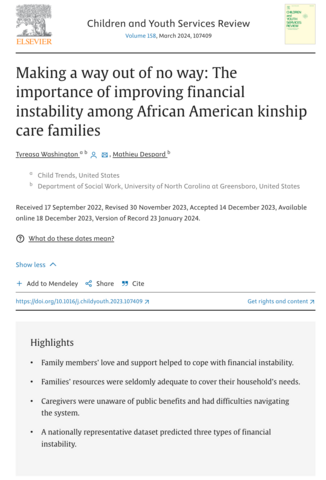Close attention should be given to the increased reliance on kinship care to provide out-of-home care for vulnerable children and youth because although these families have various strengths, they also frequently face financial instability and experience material hardship. Living in poverty and experiencing material hardship are linked to an array of negative outcomes, including physical and mental health problems, elevated parental stress, and children’s academic difficulties and social and behavioral problems.
This study examined African American families who are providing informal kinship care with the aim of developing a nuanced understanding of the financial characteristics, challenges, and coping strategies of these families.
Data for this study were obtained from two sources: (1) an exploratory sequential mixed-method pilot study and (2) the National Financial Capability Study. It was found that most caregivers in the pilot reported their family resources were only seldom or sometimes adequate to cover their household’s basic needs. Some caregivers reported being unaware of public benefits and community resources available for kinship care families, and they had difficulties navigating the system. Additionally, family members’ love and support for each other helped them to cope with financial instability.
Using a nationally representative dataset, predicted probabilities for three types of financial instability were higher among households with demographic characteristics of kinship care families including difficulty covering expenses, having income that exceeds expenses, and having emergency savings. Implications for practice, policy, and future research are discussed.

